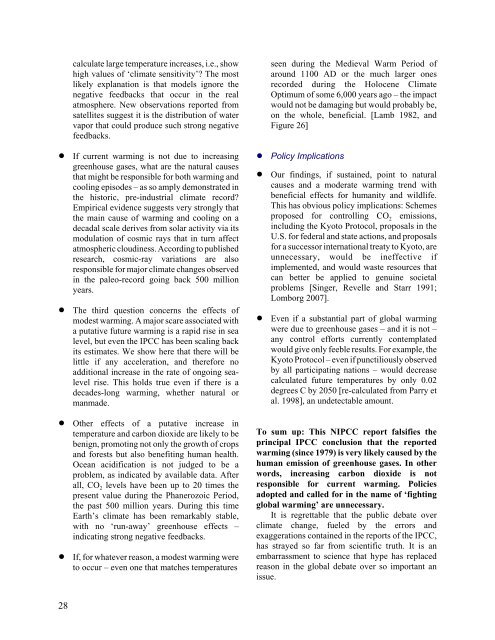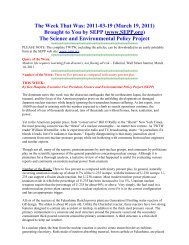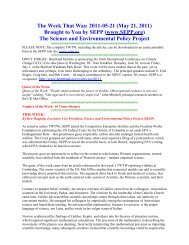Nature, Not Human Activity, Rules the Climate - Science ...
Nature, Not Human Activity, Rules the Climate - Science ...
Nature, Not Human Activity, Rules the Climate - Science ...
Create successful ePaper yourself
Turn your PDF publications into a flip-book with our unique Google optimized e-Paper software.
calculate large temperature increases, i.e., showhigh values of ‘climate sensitivity’? The mostlikely explanation is that models ignore <strong>the</strong>negative feedbacks that occur in <strong>the</strong> realatmosphere. New observations reported fromsatellites suggest it is <strong>the</strong> distribution of watervapor that could produce such strong negativefeedbacks.! If current warming is not due to increasinggreenhouse gases, what are <strong>the</strong> natural causesthat might be responsible for both warming andcooling episodes – as so amply demonstrated in<strong>the</strong> historic, pre-industrial climate record?Empirical evidence suggests very strongly that<strong>the</strong> main cause of warming and cooling on adecadal scale derives from solar activity via itsmodulation of cosmic rays that in turn affectatmospheric cloudiness. According to publishedresearch, cosmic-ray variations are alsoresponsible for major climate changes observedin <strong>the</strong> paleo-record going back 500 millionyears.! The third question concerns <strong>the</strong> effects ofmodest warming. A major scare associated witha putative future warming is a rapid rise in sealevel, but even <strong>the</strong> IPCC has been scaling backits estimates. We show here that <strong>the</strong>re will belittle if any acceleration, and <strong>the</strong>refore noadditional increase in <strong>the</strong> rate of ongoing sealevelrise. This holds true even if <strong>the</strong>re is adecades-long warming, whe<strong>the</strong>r natural ormanmade.! O<strong>the</strong>r effects of a putative increase intemperature and carbon dioxide are likely to bebenign, promoting not only <strong>the</strong> growth of cropsand forests but also benefiting human health.Ocean acidification is not judged to be aproblem, as indicated by available data. Afterall, CO 2 levels have been up to 20 times <strong>the</strong>present value during <strong>the</strong> Phanerozoic Period,<strong>the</strong> past 500 million years. During this timeEarth’s climate has been remarkably stable,with no ‘run-away’ greenhouse effects –indicating strong negative feedbacks.! If, for whatever reason, a modest warming wereto occur – even one that matches temperaturesseen during <strong>the</strong> Medieval Warm Period ofaround 1100 AD or <strong>the</strong> much larger onesrecorded during <strong>the</strong> Holocene <strong>Climate</strong>Optimum of some 6,000 years ago – <strong>the</strong> impactwould not be damaging but would probably be,on <strong>the</strong> whole, beneficial. [Lamb 1982, andFigure 26]! Policy Implications! Our findings, if sustained, point to naturalcauses and a moderate warming trend withbeneficial effects for humanity and wildlife.This has obvious policy implications: Schemesproposed for controlling CO 2 emissions,including <strong>the</strong> Kyoto Protocol, proposals in <strong>the</strong>U.S. for federal and state actions, and proposalsfor a successor international treaty to Kyoto, areunnecessary, would be ineffective ifimplemented, and would waste resources thatcan better be applied to genuine societalproblems [Singer, Revelle and Starr 1991;Lomborg 2007].! Even if a substantial part of global warmingwere due to greenhouse gases – and it is not –any control efforts currently contemplatedwould give only feeble results. For example, <strong>the</strong>Kyoto Protocol – even if punctiliously observedby all participating nations – would decreasecalculated future temperatures by only 0.02degrees C by 2050 [re-calculated from Parry etal. 1998], an undetectable amount.To sum up: This NIPCC report falsifies <strong>the</strong>principal IPCC conclusion that <strong>the</strong> reportedwarming (since 1979) is very likely caused by <strong>the</strong>human emission of greenhouse gases. In o<strong>the</strong>rwords, increasing carbon dioxide is notresponsible for current warming. Policiesadopted and called for in <strong>the</strong> name of ‘fightingglobal warming’ are unnecessary.It is regrettable that <strong>the</strong> public debate overclimate change, fueled by <strong>the</strong> errors andexaggerations contained in <strong>the</strong> reports of <strong>the</strong> IPCC,has strayed so far from scientific truth. It is anembarrassment to science that hype has replacedreason in <strong>the</strong> global debate over so important anissue.28





